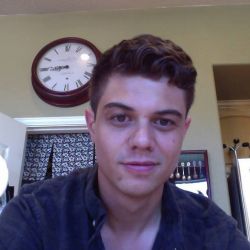
Taylor Colburn
Taylor Colburn graduated from ASU in Spring 2018 and he is a Visiting Researcher in CBP for 2019. He has a particular interest in applying mathematical methods and paradigms from physics to complex biological systems.
Taylor has been working alongside Sean Seyler to apply methods of comparing conformational transitions of proteins obtained through MD simulations and enhanced sampling algorithms, particularly in the context of membrane transporters.
Taylor started in science as a volunteer researcher with the Translational Neurotrauma Research Program, a joint venture through Barrow Neurological Institute at Phoenix Children’s Hospital, Department of Child Health at the University of Arizona, College of Medicine – Phoenix, and Phoenix Veterans Administration Healthcare System. Here, he worked with a microelectrode electrochemistry model to gain insight into glutamate kinetics in the brains of anesthetized rodents. He went on to join the Beckstein Lab at ASU in the fall of 2015.
In addition to having a fondness for statistical mechanics and complex systems theory, Taylor enjoys playing and writing music and indoor rock climbing.
Presentations and posters
- Joint Meeting of the Four Corners and Texas Sections of the American Physical Society, Las Cruces, NM. Talk: Simulating conformational transitions of the transmembrane symporter , T. Colburn, S.L. Seyler, and O. Beckstein, Oct 21, 2016
- BioPhest Meeting 2016, University of Arizona, Tucson, AZ, Talk: Sampling the inward-facing to outward-facing transition of the hydantoin transporter Mhp1, T. Colburn, S.L. Seyler, and O. Beckstein, April 16, 2016.
Honors and Awards
- Tsong Prize for Undergraduate Research 2017 — Department of Physics at Arizona State University for Simulating the conformational transitions of the transmembrane symporter Mhp1.
- ASU CLAS Undergraduate Summer Enrichment (USE) Scholarship (summer 2015) — Arizona State University, College of Liberal Arts and Sciences — provides $1,500 to carry out research (in the Beckstein Lab) over the summer 2016. Additional incentives (up to $500 in total) will be paid out if the research is presented at local meetings and successfully transitioned into scholarship (e.g. presentation at regional/national meeting, paper, or grant application).

